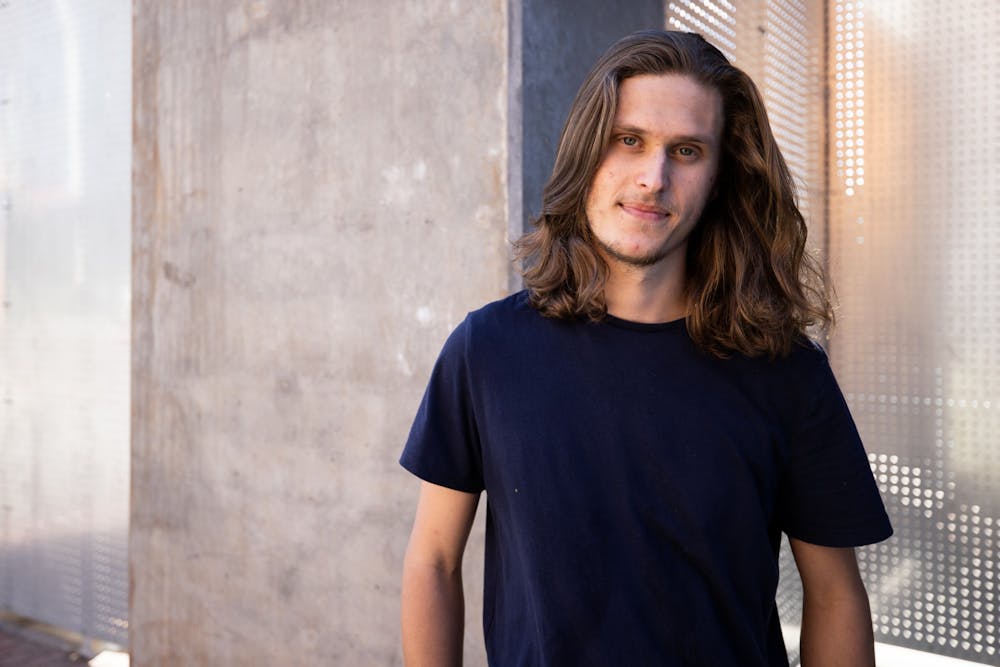ASU alumnus Austin Davis has returned to ASU for the release of his second book, "Compulsive Swim" — a collection of poems about mental health, homelessness and fentanyl abuse that was published on Jan. 21. A book release event was held at ASU's Memorial Union on Feb. 1.
Besides being an author, Davis is also the founder of AZ Hugs, an organization that helps people experiencing homelessness by providing them with essentials and requested deliveries. His poems are a collection that is inspired by what he has seen on the streets as well as his own experiences living with OCD.
The process of writing the novella started in the summer of 2022 when he got a grant from the city of Phoenix to turn his minivan into a mobile cooling unit in the desert heat. With his new mobile air conditioning unit, he went to different homeless camps in Phoenix to offer relief from the heat.
"I would come home and at night I started writing a lot of these weird abstract poems about the streets," Davis said. "But also about what I was going through with my mental health."
While inspired by his personal experiences and encounters, Davis did not originally plan to write another novella.
"I was just kind of writing poems because I was feeling sad, and it developed into having this narrative," Davis said. "These strings started to form and attach themselves about what's going on in the streets with the fentanyl crisis, the lack of affordable housing and the mental health crisis."
Davis pulls from real-life moments for his writing. One poem featured in the novella is about a moment spent meditating with a mother and son who live on the street. In the piece, he writes about "joy being a currency that we should spend all at once" and continues to say how people are bound to be robbed of it.
While he was at ASU, the Creative Writing Program is where he found his niche, providing him with a small environment that allowed him to share his poems and start a conversation about the things he wanted to talk about. One of his mentors, professor of English Neal Lester, has known Davis since his freshman year of college.
Davis described how Lester taught him how to use his passion for poetry to write about his experiences and turn them into social justice pieces.
Lester is also the director of Project Humanities, an organization that facilitates conversations across different ASU communities to study and research humanities. The two have previously collaborated to provide clothing, blankets and toiletries to the homeless.
"I'm pretty hyped up about how great he is, and with such humility also," Lester said. "There are people who are doing great things and their names are splashed all over the place, but there's a certain kind of humility that comes with Austin in his ability to sort of attract folks who are also interested in doing sort of the work of humanity."
Another mentor of Austin's is assistant professor of English at ASU Jennifer Irish, who was the host for the book release. She also read from her own work at the event and has known Austin since the early stage of his writing career.
Irish held different workshops for undergraduates when Davis was preparing to apply for the creative writing concentration.
"He was already thinking seriously about what a person might do with writing beyond the classroom,” Irish said in an email. "To meet someone with such a genuine commitment to helping others and who does so with recognition and respect for the complexity of each person's experience is not only inspiring, I think it uplifts those who experience his work and encourages them to consider how they navigate the world."
After graduating in 2022 with a bachelor's in creative writing, Davis has already published two books and is continuing his work in AZ Hugs. The organization most recently hosted a Sunday Family Picnic event on Feb. 12 where food, laundry and clothing were among the resources that were provided.
Davis seeks to continue to assist the community through his organizational work and through his writing, and hopes that it will spark conversations on nuanced, difficult topics.
"One of my main goals was to try to use poetry as a tool to at least open up the door for these conversations," Davis said. "Whether it's stigmas around homelessness or using substances, there's a human being, there's a person, there's someone who's deserving of dignity, respect, and a community that rallies around that person to help them during their most difficult times."
Edited by Sadie Buggle, Reagan Priest and Luke Chatham.
Reach the reporter at lboykins@asu.edu and follow @BoykinsLauren on Twitter.
Like The State Press on Facebook and follow @statepress on Twitter.




